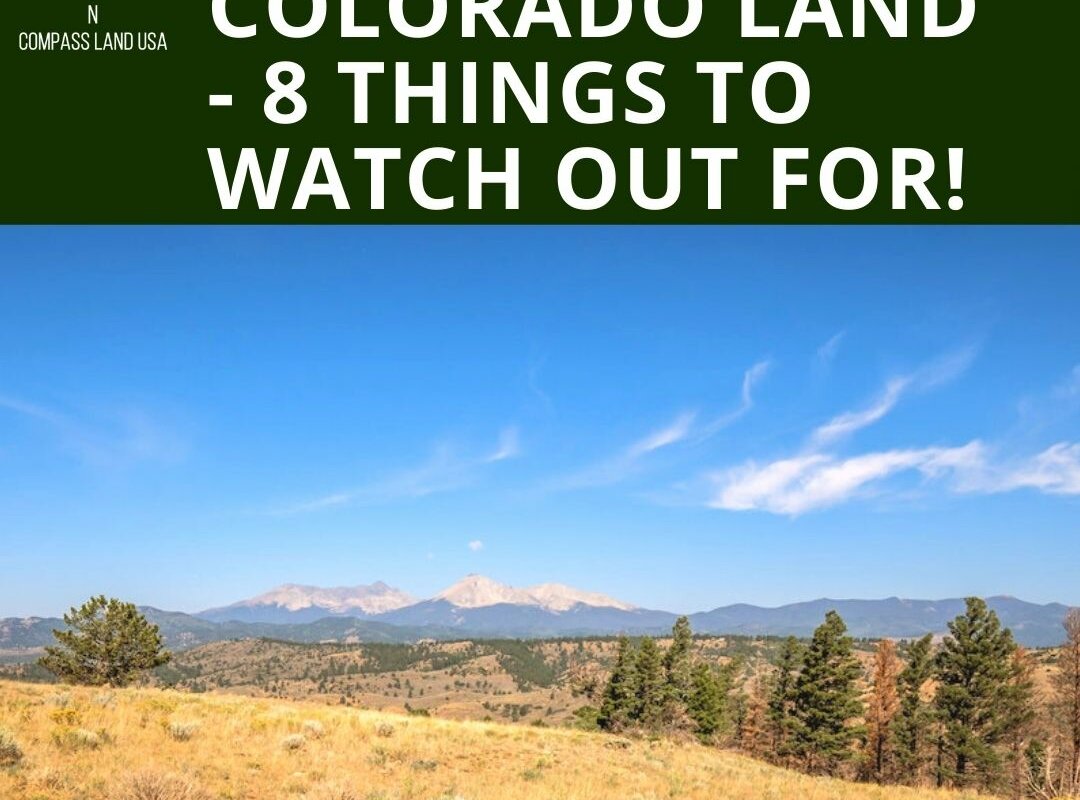In this video, Felicia talks about how to buy Colorado land and the 8 key things you need to watch out for. If you’re looking for rural or vacant land in Colorado for sale, knowing what points to look for can really help you find the right property for you.
From the video:
Hey everyone it’s Felicia from Compass Land USA.
Today I want to share some pro tips with you that will help you buy Colorado land.
So when you’re buying land in Colorado, there are 8 key things that you need to watch out for. When my company invests in Colorado land, we follow these same 8 points, so I’m really sharing the secrets with you here today.
You don’t want to skip any of these steps because it could really derail your whole land purchase.
So let’s start with the obvious – you need to confirm who owns the property. There are unfortunately some bad people out there who will try to scam you, and you need to protect yourself. You need to know that the seller actually has the right to sell you the property.
If you want to see the step by step of how you can check this, and steps for each of the 8 points, I have them detailed out in our Colorado land buying guide. It’s free for you, just click the link below and tell me where to send the guide and you’ll get it right away.
Ok, so the second point, you need to check for delinquent back taxes. This is a really crucial one because you could be buying a Colorado property that has 100s or even 1000s of dollars of property taxes owing, and as the new owner, you would be responsible for these debts.
As the new property owner, you take on any existing debts for the property, so don’t skip this one.
Third point, you really need to understand the property uses. I’ve seen lots of people get their heart broken because they’ve bought land and they wanted to camp on it, for example, or RV, but, it’s not allowed.
Land use can be limited by 3 factors: the county zoning, city bylaws, and HOA level restrictions. Start at the top, and work your way down the list to really understand what you can and can’t do on your property.
Fourth, you need to check for legal access. This is not a given for Colorado mountain land! You don’t want to be in a position where you end up with a totally landlocked property, and you can only reach it by county easement or an unofficial, and probably privately owned trail.
Then there are properties that have access, but it’s difficult. So for those, you would need an off-road vehicle, maybe an ATV, or even by horseback. Those properties are really cool and great if you want more privacy, but they’re not for everyone so make sure you know what you’re getting into.
The fifth point, you need to check for utilities. You’re probably thinking “Felicia obviously if I’m looking at Colorado land out in the middle of nowhere, I don’t expect it to have utilities”. You have a valid point, but included in this utility umbrella is well and septic.
And chances are, you’re going to want to know if you’re allowed to bring in septic and if you can drill a well, and how deep.
Sixth point, you want to check for an HOA or POA. That’s a home owner or property owner association. You need to do this for 2 reasons: First, these associations often have annual dues, and sometimes they can be pretty expensive so you need to know how much.
Second, we mentioned it briefly before, these associations have their own restrictions on land use.
Seventh point, check for water and mineral rights. Water rights are especially important because without them, it’s much more difficult to build on the property. Mineral rights aren’t crucial, but it’s nice to know whether you own anything under the dirt on your property.
I have a pro tip in the guide for this one that will really make your life a lot easier. Yea I guess I’ll just tell you, and if you want to see the other pro tips you can grab the guide. So for this one, it’s a good idea to have a title company perform a water and mineral rights search for you. It’s going to make your life a lot simpler, a lot less of a headache from trying to do this yourself.
Last point, number 8 you want to check minimum septic acreage. Some counties in Colorado will require 1-acre minimum as guidance for septics.
In some areas, it could be more or less than 1 acre because of other environmental factors that will determine how much space is needed.
Hopefully, this video helps you buy Colorado land.
Don’t forget to grab your free copy of the Colorado Land Buying Checklist guide. Just click the link below, and then tell me where to send that guide to. I’ll have it in your email inbox within an hour.
If you liked this video please give it a thumbs up, leave a comment and let me know if this was helpful for you, I want to hear from you guys to learn what content is useful you so I can get the best content possible for you.
Make sure you subscribe so you can see more info like this, and all of our newest property tours.
If you have any questions about these 8 points, leave a comment below and I’ll help you out. Thank you for watching, and I’ll talk to you soon. 🙂

Want Your Own Colorado Land Buying Guide? (complete with a list of things to check before you buy!)
You can get yourself it for free – just fill out the form below!


